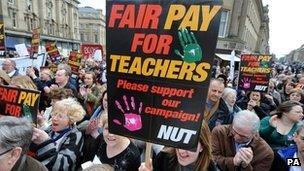Teachers in England and Wales to strike
- Published

The strikes are part of an ongoing row over teachers' pay, pensions and workload
Teachers in England and Wales are to stage a series of strikes in a continuing row over pay, pensions and workload, unions have announced.
The industrial action will start in the summer term, the two largest teaching unions, the National Union of Teachers (NUT) and NASUWT have said.
The move is an escalation of months of industrial action short of a strike.
"We are very disappointed," said a spokesman for England's Department for Education (DfE).
In a joint statement, the two unions said a series of localised strikes would begin on 27 June in the north-west of England.
The statement said that unless the government responded positively to their demands "a rolling programme of strike action will continue into the autumn term and will include a one day all-out national strike before the end of the autumn term".
Joint campaign
Between them the two unions represent nine out of 10 teachers. They are angry about changes to their pensions, increased workload and about government plans to bring in performance-related pay from September this year
They say the next phase of their joint campaign "to protect teachers and defend education" follows "the refusal" of the Education Secretary, Michael Gove, "to genuinely engage with the NASUWT and NUT to seek to resolve our trade disputes with him".
NASUWT general secretary Chris Keates said: "The time has come for the secretary of state to listen to the concerns of teachers and school leaders.
"He has recklessly pursued a relentless attack on the profession and teachers' patience has been exhausted.
"The secretary of state still has time to avoid widespread disruption in schools by responding positively and quickly to the reasonable demands we are making."
NUT general secretary Christine Blower said: "We have already rejected the new pension arrangements and the proposed deregulation of teachers' pay.
"The attacks on pay and pensions in combination with increasing workload are making teaching an unsustainable option for many.
"The resolution to all the aspects of our dispute with the secretary of state is in his hands. He can respond positively engage with us to seek a way forward."
'Disrupt education'
The unions are planning a series of rallies and an escalation of their industrial action short of strike action.
The Department for Education spokesman said: "We are very disappointed that the NUT and NASUWT have decided to take strike action, which less than a quarter of teachers actually voted for.
"Industrial action will disrupt pupils' education, hugely inconvenience parents and damage the profession's reputation in the eyes of the public at a time when our reforms are driving up standards across the country.
"We think giving schools the freedom to reward good performance is much fairer than current arrangements which see the vast majority of teachers automatically getting a pay rise each year. We have met frequently with the NUT and NASUWT to discuss their concerns and will continue to do so."
In a speech at the Conservative party annual conference in October, Michael Gove attacked the industrial action, accusing union leaders of "letting their ideology hold back our children".
In December, he called for the pay of teachers who worked to rule to be cut if they were in breach of contract.
Stephen Twigg, Labour's shadow education secretary urged more negotiation in order to avoid strike action.
"The education secretary needs to end his hostile rhetoric about teachers. His decision to scrap Labour's Social Partnership ended a useful vehicle to resolve disputes without industrial action.
"Strikes are a sign of failure and all sides involved must make every effort to avert them. Like parents and pupils, we do not want to see schools disrupted. This is an industrial dispute that needs to be resolved by government and unions."
A spokesman for the Welsh government said it was continuing to talk to the two unions, though teachers' pensions and pay were not devolved to Wales and were therefore negotiated with Whitehall.
The NASUWT said 40% of its membership voted in an industrial action ballot, of whom 82% voted to strike.
Among NUT members, the turnout was 27% of whom 82.5% voted for strikes.
Dr Mary Bousted, leader of the Association of Teachers and Lecturers (ATL) said that despite sharing concerns about planned changes to pay and pensions members had not expressed a desire to take strike action: "at present we don't have any evidence that that is what they require".
- Published12 December 2012
- Published9 October 2012
- Published7 September 2012
- Published16 May 2012
- Published7 April 2012
- Published30 June 2011